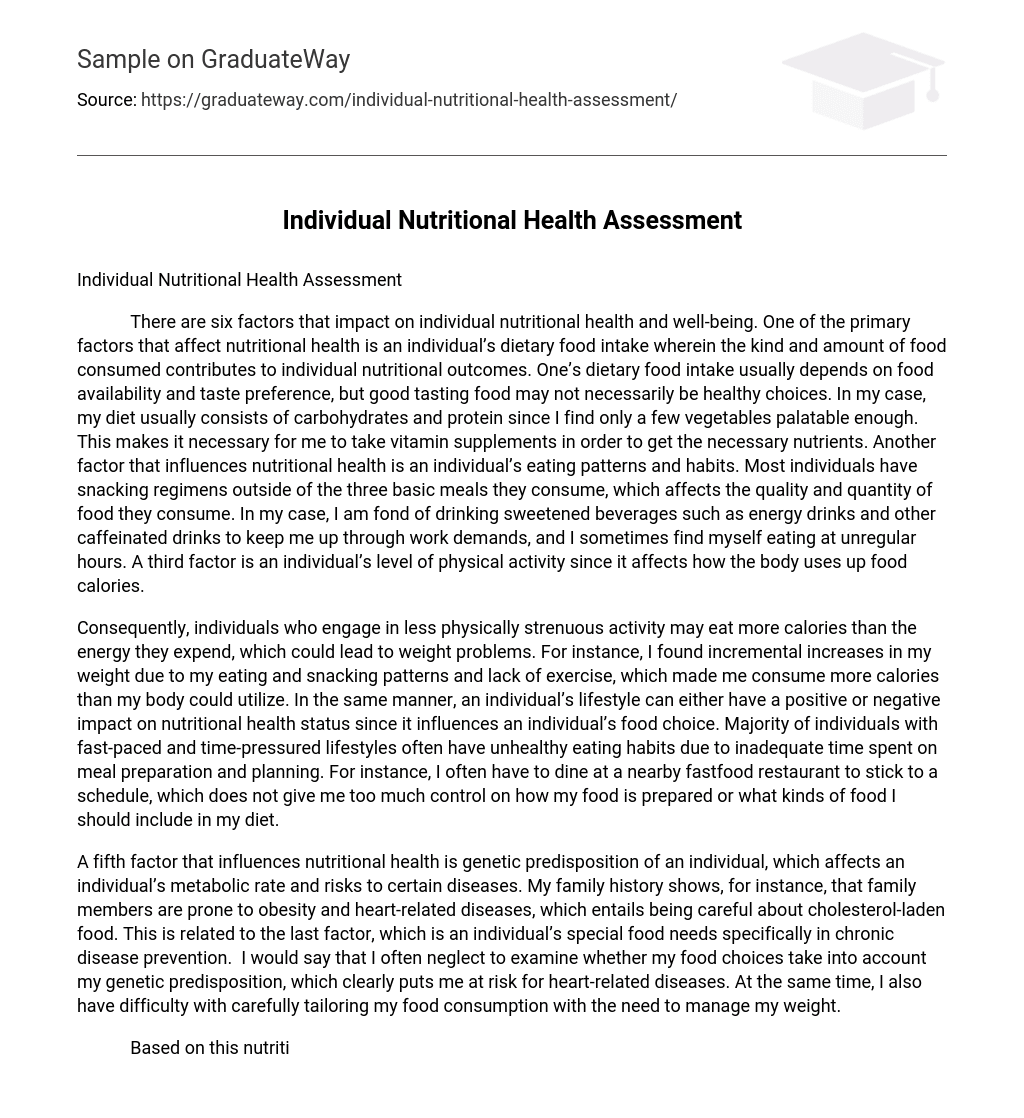There are six factors that impact on individual nutritional health and well-being. One of the primary factors that affect nutritional health is an individual’s dietary food intake wherein the kind and amount of food consumed contributes to individual nutritional outcomes. One’s dietary food intake usually depends on food availability and taste preference, but good tasting food may not necessarily be healthy choices. In my case, my diet usually consists of carbohydrates and protein since I find only a few vegetables palatable enough. This makes it necessary for me to take vitamin supplements in order to get the necessary nutrients. Another factor that influences nutritional health is an individual’s eating patterns and habits. Most individuals have snacking regimens outside of the three basic meals they consume, which affects the quality and quantity of food they consume. In my case, I am fond of drinking sweetened beverages such as energy drinks and other caffeinated drinks to keep me up through work demands, and I sometimes find myself eating at unregular hours. A third factor is an individual’s level of physical activity since it affects how the body uses up food calories.
Consequently, individuals who engage in less physically strenuous activity may eat more calories than the energy they expend, which could lead to weight problems. For instance, I found incremental increases in my weight due to my eating and snacking patterns and lack of exercise, which made me consume more calories than my body could utilize. In the same manner, an individual’s lifestyle can either have a positive or negative impact on nutritional health status since it influences an individual’s food choice. Majority of individuals with fast-paced and time-pressured lifestyles often have unhealthy eating habits due to inadequate time spent on meal preparation and planning. For instance, I often have to dine at a nearby fastfood restaurant to stick to a schedule, which does not give me too much control on how my food is prepared or what kinds of food I should include in my diet.
A fifth factor that influences nutritional health is genetic predisposition of an individual, which affects an individual’s metabolic rate and risks to certain diseases. My family history shows, for instance, that family members are prone to obesity and heart-related diseases, which entails being careful about cholesterol-laden food. This is related to the last factor, which is an individual’s special food needs specifically in chronic disease prevention. I would say that I often neglect to examine whether my food choices take into account my genetic predisposition, which clearly puts me at risk for heart-related diseases. At the same time, I also have difficulty with carefully tailoring my food consumption with the need to manage my weight.
Based on this nutritional health assessment, I need to implement some changes in dietary intake and food consumption patterns in order to improve over-all nutritional health status. One specific strategy that I need to adopt is to reduce consumption of highly-refined, processed food that often has higher levels of cholesterol and trans-fatty acids. This means shifting towards food with lower fat and caloric content and eating more balanced meals. In particular, this would entail planning meals according to the basic food groups of grains, fruits and vegetables, and meat groups. In addition, the ‘Dietary Guidelines for Americans’ suggests improving the variety of food taken from each food group in order to have adequate caloric intake that is necessary for maintaining a healthy weight. Another dietary strategy that would contribute to my nutritional health is to increase consumption of dark and orange vegetables, fruits, whole grains, and low fat milk and milk products (USDHS & USDA, 2005, p. 6). Since the nutritional health assessment shows that I usually eat carbohydrates and meat, I would have to specifically focus on increasing vegetables and fruits in my diet. This would ensure that I am getting adequate nutrients such as multivitamins and minerals. A third strategy is to reduce consumption of sweetened and caffeined beverages that contributes to unnecessary calories in the diet. Hence, I should shift to drinking more water and low-fat milk to prevent the additional calories in my diet. Lastly, I should examine my snacking patterns and replace unwholesome, high-cholesterol and high-sodium snacks with either grains or fruits.
Reference:
USDHS & USDA (2005). Dietary guidelines for Americans. Retrieved November 13, 2008 from http://www.health.gov/dietaryguidelines/dga2005/document/pdf/DGA2005.pdf





